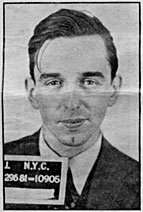On a cold, stormy November night in 1944 a German U-Boat surfaced off the coast of Maine near Hancock. William Colepaugh and Erich Gimpel slipped off the sub and into a rubber raft. Then they began rowing to shore as the U-boat disappeared beneath the waves.
After landing the small boat, the two men began making their way toward Bangor.
Spied in Maine
It wasn’t long before the two men – clad in light topcoats and suits and using a compass as they walked along the road – provoked some curiosity. Harvard Hodgkins, a 17-year-old Hancock boy, spotted the pair while making his way home from a school dance in the storm. He had been curious enough to follow the men’s’ tracks in the snow to the little raft they had come ashore in.
When he got home, he told his parents about the strange men and their boat. His father, a deputy sheriff, called the FBI. Hodgkins had witnessed that night the landing of two Nazi spies in the U.S. – albeit not the most competent spy duo ever.
William Colepaugh
William Colepaugh, born in 1918 in Niantic, Conn., took an unlikely path to his career as a spy. Perhaps because of his German mother, as a child he developed an awe for the German military machine. Armed with a prep school background, he enrolled in the Massachusetts Institute of Technology, but he never finished his degree.
During these years, there was little evidence that he was coming under the sway of the German government. He had a friend in Boston’s German consulate and attended a birthday party thrown for Hitler. But all that happened well before the U.S. entered the war.
Instead, in 1942 Colepaugh joined the U.S. Navy. After an honorable discharge in 1943, he went to sea in the merchant marine as a mess boy. In port in Portugal, he left the ship and contacted the German consulate. He then declared he wanted to join the German army.
The Germans, however, had other ideas. They took William Colepaugh into their school for spies. After a brief training, 26-year-old Colepaugh was paired with Erich Gimpel, a 35-year-old radio engineer and an actual spy.
Not His Dream Job
Trained in bomb-making, photography and short-wave radio, the two men returned to America on the U-boat that ultimately dropped them in Maine. There, the Germans hoped, Colepaugh’s American background and Gimpel’s skills would let them gather information on America’s nuclear weapons plans.
Colepaugh was, apparently, a reluctant spy. He had dreamt of participating in the powerful German army. But he viewed slipping around the United States trying to gather useful military intelligence as a different matter.
With $60,000 in cash, a pocketful of diamonds and the makings of a radio, the two men made their way to New York City. Though he was no James Bond when it came to his espionage skills, Colepaugh did have two of the famous spy’s other skills down. The ladies liked him, and he liked to drink.
In fact, Gimpel would later say he never knew anyone with such a thirst for booze. Colepaugh’s thirst, however, may have been a byproduct of fear. By Christmas, the two men had burned through more than $2,500 in cash. They also started arguing. Colepaugh, afraid of his partner, fled the apartment they shared for a hotel. He then contacted a friend, telling him that he had made a huge mistake and wanted to contact the FBI.
With Colepaugh in hand, the FBI soon tracked down Gimpel, who spoke little English. If his plan was to win leniency by turning himself in, Colepaugh failed. A jury sentenced him to be hanged. In fact, Gimpel got the better sentence; he was to be executed by firing squad, a more honorable punishment.
Rotarian
Fate intervened for the two men when Franklin Roosevelt died in April of 1945, just days before they were to be executed. With Germany well on its way to officially surrendering, the new president Harry Truman – an opponent of capital punishment – commuted the men’s sentences.
Gimpel would later be shipped back to Germany, where he would tell his story to interviewers and write a book about it. Colepaugh, meanwhile, occupied a bunk in Leavenworth Prison, where he was a model prisoner and learned the trade of metalworking.
In 1960, he won his release and would settle in Pennsylvania and marry. For the remainder of his life he declined to discuss his days as a spy or why he made the choice he did. But he was highly regarded in his community, known mainly for his volunteer work as a Rotarian.
As for Harvard Hodgkins, when news of his adventure broke, he and his family were invited to New York as guests of a newspaper. They took a whirlwind tour that included a visit with Babe Ruth atop the Empire State Building.
This story was updated in 2024.



2 comments
[…] how did a small town girl from Adams, Mass. get to become a Soviet spy funneling state secrets from West to East for more than 25 years? Historians don’t know the details. Lona was born […]
This version of events is somewhat at variance with the book that Gimpel wrote, “Spion für Deutschland”.
Comments are closed.